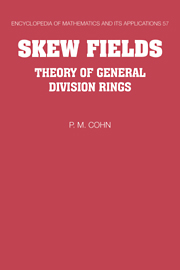Book contents
- Frontmatter
- Contents
- Preface
- Note to the reader
- Prologue
- 1 Rings and their fields of fractions
- 2 Skew polynomial rings and power series rings
- 3 Finite skew field extensions and applications
- 4 Localization
- 5 Coproducts of fields
- 6 General skew fields
- 7 Rational relations and rational identities
- 8 Equations and singularities
- 9 Valuations and orderings on skew fields
- Standard notations
- List of special notations used throughout the text
- Bibliography and author index
- Subject index
7 - Rational relations and rational identities
Published online by Cambridge University Press: 05 November 2011
- Frontmatter
- Contents
- Preface
- Note to the reader
- Prologue
- 1 Rings and their fields of fractions
- 2 Skew polynomial rings and power series rings
- 3 Finite skew field extensions and applications
- 4 Localization
- 5 Coproducts of fields
- 6 General skew fields
- 7 Rational relations and rational identities
- 8 Equations and singularities
- 9 Valuations and orderings on skew fields
- Standard notations
- List of special notations used throughout the text
- Bibliography and author index
- Subject index
Summary
The specialization lemma in one of its forms (Prop. 6.2.7) states that in a field of infinite degree over its centre, itself infinite, there are no rational identities, and the proof depended on Amitsur's GPI-theorem. In 7.1 we again take up GPIs and examine their relation with ordinary polynomial identities.
The functional approach leads in 7.2 to another treatment of rational identities in fields, and the rational topology, a topic to which we shall return in Ch. 8. To study rational identities we need, besides the free field, the generic division algebras of different PI-degrees. They are introduced in 7.3; the specializations between them are described there and are illustrated in 7.4.
The rest of the chapter is devoted to an exposition of Bergman's theory of specializations. The basic notions of rational meet and support relation are explained in 7.5 and in 7.6 we see how they are realized in generic division algebras. Finally in 7.7 examples of the different support relations are given, showing the totally different behaviour in the non-commutative case.
Polynomial identities
Every ring satisfies certain identities such as the associative law: (xy)z = x(yz). In a field the situation is less simple; we have rational identities like xx-1 = 1 or (xy)-1 = y-1x-1, but here it is necessary to restrict x and y to be different from zero. In order to discuss rational identities over a field it is helpful first to summarize the situation for rings.
- Type
- Chapter
- Information
- Skew FieldsTheory of General Division Rings, pp. 331 - 365Publisher: Cambridge University PressPrint publication year: 1995



